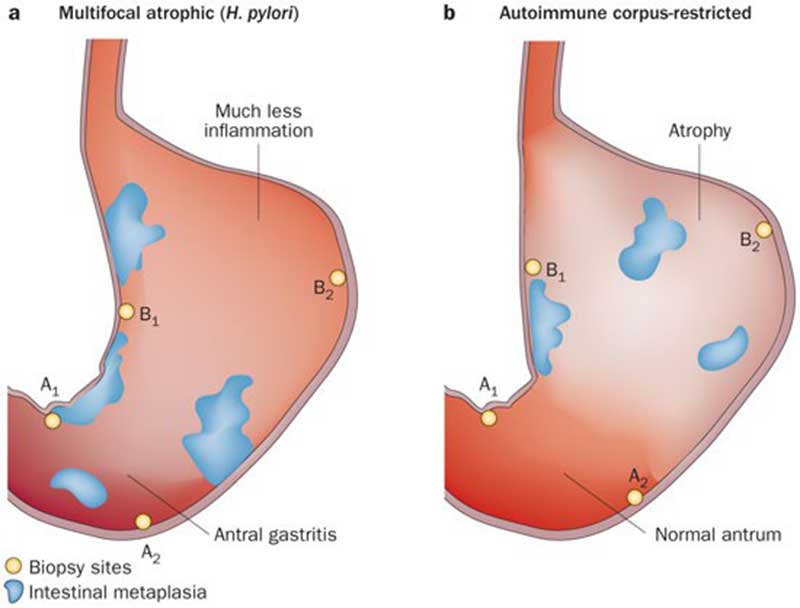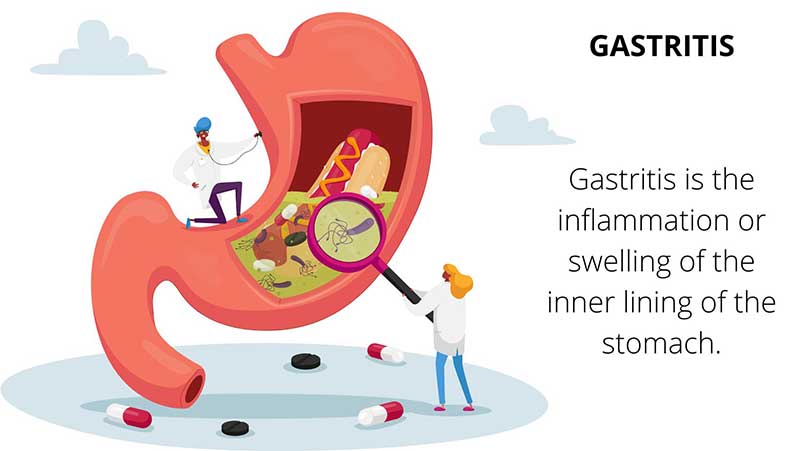Gastritis is a common condition that affects the stomach lining, causing inflammation and discomfort. It can range from mild to severe and may have various causes. In this article, ozinsight will explore the symptoms of gastritis, its causes, diagnosing methods, and treatment options.
Introduction
Gastritis refers to the inflammation of the stomach lining, which can lead to various digestive issues and discomfort. Understanding the symptoms of gastritis is essential for timely diagnosis and treatment. Let’s delve into the topic and explore the different aspects of this condition.
Symptoms of Gastritis
Gastritis can manifest with a range of symptoms, some of which are common and others that may indicate a more severe form of the condition. The following are the key symptoms associated with gastritis:
Common symptoms of gastritis:
- Abdominal pain or discomfort
- Nausea and vomiting
- Indigestion and bloating
- Loss of appetite
- Belching and hiccups
- Acid reflux or heartburn
Severe symptoms of gastritis:
- Persistent and intense abdominal pain
- Vomiting blood or material that resembles coffee grounds
- Black, tarry stools
- Difficulty swallowing or severe throat pain
- Unexplained weight loss
It’s important to note that some symptoms, such as acid reflux and heartburn, can overlap with gastroesophageal reflux disease (GERD). Understanding the similarities and differences between gastritis and acid reflux can help in proper diagnosis and treatment.
If you experience any of the severe symptoms mentioned above or if your symptoms persist or worsen over time, it is crucial to consult a doctor for a thorough evaluation.
![]()
Causes of Gastritis
Several factors can contribute to the development of gastritis. Understanding the underlying causes is vital for effective treatment. Here are some common causes of gastritis:
H. pylori infection: The most common cause of gastritis is an infection by Helicobacter pylori bacteria. This bacterium is usually acquired during childhood and can lead to chronic inflammation if left untreated.
Medications and NSAIDs: Prolonged use of certain medications, such as nonsteroidal anti-inflammatory drugs (NSAIDs) like aspirin and ibuprofen, can irritate the stomach lining and cause gastritis.
Alcohol and smoking: Excessive alcohol consumption and smoking can damage the stomach lining, leading to gastritis.
Stress and autoimmune disorders: Severe stress or autoimmune disorders, such as pernicious anemia or autoimmune gastritis, can trigger inflammation of the stomach lining.
Other causes of gastritis: Other factors, such as viral infections, bile reflux, radiation therapy, and certain diseases like Crohn’s disease or HIV/AIDS, can also contribute to the development of gastritis.

Diagnosing Gastritis
Diagnosing gastritis involves a combination of medical history evaluation, physical examination, and diagnostic tests. The following methods are commonly used for diagnosing gastritis:
Physical examination and medical history: Your doctor will discuss your symptoms, medical history, and any potential risk factors to determine the likelihood of gastritis.
Diagnostic tests for gastritis: Various tests, such as blood tests, stool tests, and breath tests, can help identify the presence of H. pylori infection or other underlying factors contributing to gastritis.
Endoscopy and biopsy: Endoscopy involves using a flexible tube with a camera to examine the stomach lining. During this procedure, the doctor may also take a small tissue sample (biopsy) for further analysis.

Treating Gastritis
The treatment of gastritis aims to relieve symptoms, promote healing of the stomach lining, and address the underlying cause. The following approaches are commonly used for treating gastritis:
Lifestyle changes: Making certain lifestyle modifications can help manage gastritis effectively. This includes avoiding triggers such as spicy and acidic foods, quitting smoking, reducing alcohol consumption, and managing stress.
Medications for gastritis: Depending on the cause and severity of gastritis, your doctor may prescribe medications such as proton pump inhibitors (PPIs), antacids, antibiotics (for H. pylori infection), or medications to reduce stomach acid production.
Dietary recommendations: Following a gastritis-friendly diet can alleviate symptoms and aid in the healing process. This typically involves consuming bland foods, avoiding irritants, and eating smaller, more frequent meals.
Natural remedies for gastritis: Some individuals find relief from gastritis symptoms by using natural remedies such as ginger, chamomile tea, probiotics, and aloe vera juice. However, it’s important to consult with a healthcare professional before trying any natural remedies.
Conclusion
Gastritis is a condition characterized by inflammation of the stomach lining. Recognizing the symptoms and understanding the causes of gastritis is crucial for prompt diagnosis and effective treatment. By adopting appropriate lifestyle changes, following medical advice, and seeking timely medical attention, individuals with gastritis can manage their condition and improve their quality of life.
FAQs
Can gastritis go away on its own?
Mild cases of gastritis may resolve on their own, especially if the underlying cause is addressed. However, chronic or severe gastritis often requires medical intervention.
Is gastritis contagious?
No, gastritis is not contagious. It is primarily caused by factors such as H. pylori infection, medications, lifestyle choices, and underlying health conditions.
Can stress cause gastritis?
While stress alone may not directly cause gastritis, it can worsen symptoms and contribute to the development of gastritis in individuals who are already susceptible.
How long does gastritis last?
The duration of gastritis varies depending on the cause, severity, and treatment. Acute gastritis may last for a few days to weeks, while chronic gastritis can persist for months or even years.
Can gastritis lead to stomach cancer?
Chronic gastritis, particularly when caused by H. pylori infection, can increase the risk of developing stomach cancer over time. However, not all cases of gastritis lead to cancer, and timely treatment and follow-up care can significantly reduce this risk.














Got a Questions?
Find us on Socials or Contact us and we’ll get back to you as soon as possible.